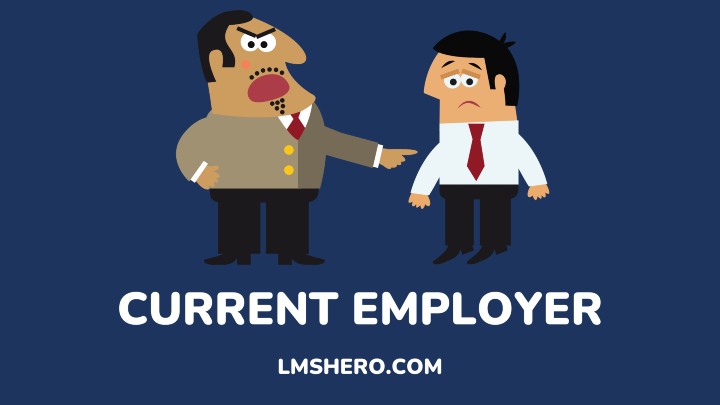Do you feel unappreciated at your current place of employment and desperately need a new employer?
There are numerous reasons why employees sometimes get frustrated with their current employer and seek better job opportunities.
This article explores the top reasons to quit your current employer, favorable conditions to look out for in a new employer, and how to negotiate your salary.
What does current employer mean?
Simply put, “current employer” means the business you are currently employed for. If you now work at X Company, that would be your current employer.

You wouldn’t list them as your current place of work if you no longer work there after previously doing so.
What are the reasons for quitting your current employer?
A company’s purchase, merger, or reorganization and the need for change are some excellent excuses for leaving a job. Toxic workspaces, abusive managers, and lack of job security are also valid reasons to quit an employer.
You may also desire leadership, industry, environment, or salary changes. A family-related issue sometimes also motivates you to leave your current job.
What are the things to look out for in a new employer?
When changing employers, there are several aspects to think about that new hires sometimes ignore. This could lead to a bad experience and force you to start your search for a new position from scratch.
When looking for a new job, keep the following goals in mind:
1. Opportunity
Your new employer must have room for your career to develop and expand. You need a place where the challenges can equal your goal and be innovative and fascinating.
2. Security
Stability and comfort in your new position are equally crucial for performing at your best. Even if this sometimes sounds a little exaggerated, “job security” is important while looking for a new workplace.
Job security guarantees less toxicity in the workplace, a lack of unnecessary competition, and maximum productivity.
3. Work-life balance
A healthy work-life balance can’t be overstated and is one of the most important characteristics to look for in a prospective employer.
Hence, comparing your expectations with those of a new employer is an effective method to ensure your new job is a good fit.
4. Reliability
Many employers promise growth and financial greatness when you first come on board only to use and dump you. Your boss should be someone you can depend on and vice versa. Finding an employer who can make promises and then keep them is crucial.
5. Stability
Stability is unquestionably one of the best advantages a post can offer while looking for a new job.
The ideal workplace will give you enough time and stability to specialize in your role. This will help you gain enough confidence in that department and build your skills.
How do you negotiate salary with your new employer?
Have you always been a victim of undervaluation because you could not properly negotiate your salary?
Here are practical ways to negotiate better pay with your current or prospective employer.
1. Control your emotions
Any form of negotiation can be tense, but maintaining your composure is crucial.
Giving out aggressive, furious, or frustrated body language is unprofessional and suggests that you can’t handle the strain.
When speaking, maintain composure and professionalism, and avoid coming across as demanding.
2. Benchmark yourself
You’ll be questioned about your pay expectations throughout the interview process, so you must provide a thoughtful response.
If you make too many demands, the interviewer can decide not to hire you. They will probably give you too little if you ask for too little. Therefore, you must provide the appropriate (and fair) amount.
3. Prepare for negotiations
After the interview, you’ll probably get a call or an email with an offer of the job and a starting wage. Despite the pay, some candidates are enticed to accept the offer.
It’s time to start negotiating (best done over the phone) if they’ve made you an offer far less than what you want.
4. Practice your negotiation skills
Before picking up the phone, asking a friend or family member for assistance could be wise. Especially if you’re not adept in the art of negotiating so you can test your approach.
5. Exude confidence
Undoubtedly, you’ll feel anxious, but after you’ve planned ahead and practiced, you’ll feel a little more confident. After all, confidence is crucial when it comes to negotiating.
Make the call only after you are thoroughly prepared, practiced, and at ease with what you are about to say. This should reduce your anxiety and allow you to project greater confidence.
While you can’t make eye contact or project a confident demeanor over the phone, you must convey confidence in your voice and what you’re saying.
6. Maintain your stance
In a negotiation, both parties discuss possible solutions, so if your potential employer’s counteroffer is lower than you’re willing to accept, tell them so and move on.
It is easier to negotiate a salary than a salary raise when you are an asset the employer wants, so do not accept a job offer if you are unhappy with the starting salary.
Do you have to tell your current employer who your new employer is?
A solid rule of thumb is to avoid disclosing your reason for leaving or your new employer to your current employer unless you are required by law to do so.
If they claim you made that agreement in your contract, they must show you exactly where you agreed to it in writing.
If you inform your present employer that you have a new job, they can try to harm your reputation with the new employer.
Additionally, it might be considered a conflict of interest, in which case you wouldn’t be quitting but rather being fired.
Can your new employer contact your current employer?
Most employers won’t call your current employer without discussing it with you. Additionally, reference checks usually don’t happen until a candidate has advanced in the selection process.
In the US, it is usual for your former company to confirm only your work dates. They won’t provide information about your position, pay, or performance history for various reasons.
If potential employers know your current job, they will often not get in touch. Therefore, you should always include a line on your resume that says, “References upon request.” Make sure they request them if they want them.
Thus, the applicant can name former employers with whom they amicably left. This is better than listing a business where you left after having a serious personality issue with your employer.
FAQs
When should you notify your current employer of your resignation?
Even if you’ve just worked at your current job for a few months, think about providing two weeks’ notice. This gives your employer some time to prepare to fill your position.
Can your current employer give a bad reference?
Your employer can give a bad or unfavorable reference if they consider it accurate and have reasonable grounds for such a belief.
Can your new employer find a previous employer not stated in your resume?
No, there isn’t a centralized database that keeps track of all your workplaces during your career. So, as long as that job that stains your record as an employee is not listed on your social media profile, prospective employees won’t find it.
Conclusion
Wanting to change your current employer does not make you a bad employee. You have every right to seek better and more fulfilling opportunities just as your employer will prioritize profit over you.
When changing your employer, always prioritize a healthy work-life balance, employee benefits, job security, and stability over trivial things like a brand name.
Be sure to properly negotiate your salary before accepting the offer. This is because it is much easier to negotiate a salary before coming on board than proving that you deserve a raise or salary increment.
I hope you found this article helpful. You can also read about the effects of firing and how it affects future employment.
Thanks for reading.







